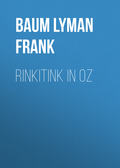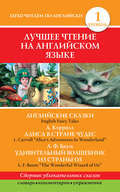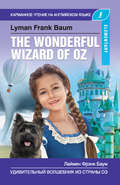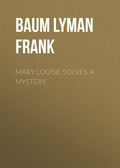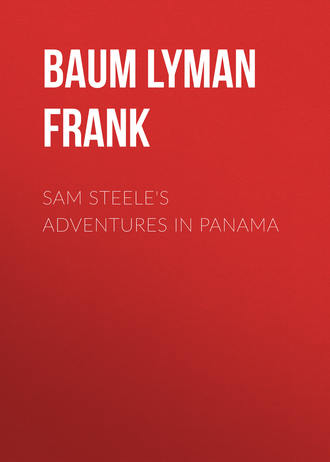
Лаймен Фрэнк Баум
Sam Steele's Adventures in Panama
“That does not sound friendly,” retorted Bryonia, frowning.
“Have you done anything to forfeit my friendship?” enquired the king, turning a swift glance upon the speaker. “Be content. Only in the king’s village should the brothers and guests of the king remain in peace and comfort. My people shall be your servants, and you may command them as you will; but you must not go outside the wall.”
We did not like this, and stood a moment silent.
“Seems to me, King Honorable Bryonia,” said Nux, speaking for the first time during the interview and addressing his friend point blank, as if the king’s presence was immaterial; “seems to me this new brother, King Nalig-Nad, is not a bad fellow. I like him because he is kind to little children, and I am sorry for him because he is not better informed. But what can you expect, when he stays in this one-horse place and knows nothing of the great world that bows at our feet? If he dares oppose your will, remember how poor and ignorant he is, and forgive him. I know what you are thinking, great King Honorable Bryonia, but I beg you not to destroy Nalig-Nad yet, or to explode his people with the terrible power you possess. Let us be patient. Permit this king to live on, for a short time, anyway. What a shame to ruin this happy home! Be patient, my mighty brother, and soon this foolish Nalig-Nad will have wisdom, and willingly grant all that you desire.”
Having delivered himself of this speech, Nux puffed his cigar again and looked at the king with a face expressive of great sympathy and concern.
Both Bry and I were fairly astounded. We had not expected Nux to take part in the discussion, and the pleading tone he had adopted was as good a bit of acting as Bryonia had yet exhibited. It impressed the king even more than Bryonia’s dignified assurances, although at first I trembled at the folly of threatening so clever and powerful a man as Nalig-Nad. After all, he was merely a savage, and more liable to suspect us of unknown powers than of unsupported audacity.
We soon discovered that Nux had grasped the situation more clearly than we had. The ruler of the San Blas was used to trickery and cunning and had trained himself to search for hidden reasons in all his dealings with outsiders. The suggestion that the owners of the strange travelling machine, who had so boldly invaded his country, had the intention and power of “exploding” himself and all his people struck him as more reasonable than anything he had yet heard. He was visibly worried, and looked half fearfully at the stern and impassive countenance of the tall South Sea Islander who stood before him.
“We will break bread,” he said, with quick decision. “Send away your slave, my brothers, and come with me.”
“Go,” said Bry, turning to me. “And go you, also, Chief Ogo,” he added, imperatively; “we would be alone with the king.”
The chief looked uneasily toward Nalig-Nad, who had set the children down and allowed them to run into the house. Noting the look, the king bowed his head to affirm Bry’s command. He might with reason fear his strange guests, but he was no coward.
I left the courtyard, followed by Ogo, and returned to where the automobile was standing.
CHAPTER XI
PRINCESS ILALAH
Leaning over the side of the machine, her chin resting upon her hands at the edge of the car, was the most beautiful girl I had ever seen. Her form was tall and slender, her features exquisitely regular in contour and her eyes deep brown and soft as velvet. Her fleecy white tunic was without color save a broad band of green that formed a zigzag pattern around its edge, and in her dark hair was twined a wreath of white blossoms with delicate green leaves.
I noticed that her skin was almost white in the sunshine, the bronze hue being so soft as to be scarcely observable. She had not the same expression of sadness that seemed an inherited characteristic of her people, but gazed upward with a faint smile that showed her dainty white teeth, full at the face of Duncan Moit. When I appeared upon the scene the inventor was sitting on the side of the car opposite the girl and returning her frank regard with a look of wonder and admiration.
A little back stood a silent group of young women, whose demeanor indicated that they were the girl’s attendants. Their eyes, I noticed, roved over the strange machine with eager curiosity.
Chief Ogo uttered an exclamation of impatience and strode quickly forward.
“This is no place for you, my Princess!” he said, addressing the girl. “You must retire at once to your rooms.”
She turned her head without altering her position and said in a calm, sweet tone:
“Does my lord Ogo command Ilalah, then?”
“When the king is not present it is my duty to guard his women,” he returned, brusquely.
With a contemptuous shrug as her only reply she looked toward Duncan again, and as if continuing a conversation already begun, she said to him in soft but awkward English:
“And shall it fly like a bird, too?”
“It can almost fly, but not quite, miss,” he answered.
“But it swims like a fish?”
“Yes, miss.”
“And runs like a deer?”
“Exactly, miss.”
“It would be to please me if it did that,” she remarked, very gently.
Duncan was puzzled for a moment; then his face brightened, and he said eagerly:
“If you will get in, I will take you to ride – you and three of your women.”
She did not hesitate at all, but turned and called three of the young women by name, who came at once to her side.
Ogo the chief, who could not follow very well the English words, was scowling fiercely, but had kept at a respectful distance since the girl had repulsed him. Enjoying his discomfiture, I promptly opened the door of the car and motioned the princess to enter. She ascended the steps lightly and I pushed her attendants after her, for I scented a lark and wanted to prevent Ogo from interfering.
I could see he was uncertain how to act, and the other bystanders were equally undecided. But no sooner had I jumped in after the women than Moit threw over the lever and started the engines, so promptly that the machine leaped forward with a bound.
We circled the king’s palace three times, while the dainty princess clung to the back of her seat and laughed delightedly and her women huddled together in abject terror. Every inhabitant flocked to the doors and windows to see us, nor could the natives control their amazement at our rapid flight.
Then Duncan headed for the arched opening in the wall, and ignoring Ogo’s wild shout to halt darted through and out upon the plains. The chief instantly notched an arrow, but the princess sprang to her feet and faced him from the rear of the car, so that he dared not shoot for fear of wounding her.
Another moment and we were out of range; and now Duncan, inspired by a natural desire to show his fair passenger what his invention could do, increased the speed until the wind whistled past our ears and our eyes were not quick enough to note the objects we passed.
I own that, being myself a sailor, I was a little frightened at this terrific dash; but Ilalah laughed gleefully and cast a slim brown arm around Duncan’s neck to steady herself as she gazed straight ahead and enjoyed to the full the excitement of the wild ride.
There was no real danger, however. The meadows were as smooth as any highway, and in an incredibly short period of time we were almost out of sight of the village.
The thought now came to me that it would not be wise for us to offend Nalig-Nad by carrying our prank too far, so I called to Duncan to return. Rather reluctantly, I imagined, he described a great circle and headed at last for the village, never abating his speed, however, until we had flown through the arch and narrowly escaped knocking over a dozen or so of the throng assembled in the enclosure.
Around the king’s palace we again sped, so as not to slacken our pace too abruptly, and then the inventor brought his wonderful machine to a halt in almost the same spot from whence we had started.
We now observed Nalig-Nad standing at the entrance to his dwelling with Nux and Bryonia on either side of him. Now that he stood upright I saw that he towered far above all his people, and was moreover straight as a gun-barrel.
As soon as we halted I opened the door and assisted the frightened attendants to reach the ground. Duncan, however, sprang out and gave his hand to Ilalah, who needed no such support. Her cheeks glowed pink through their rich tinting, her eyes sparkled brightly and there could be no question of her delight in her recent novel experience.
As soon as her feet touched the ground she ran to the king and seized his arm affectionately, crying aloud in her native tongue:
“Oh, my father, it is a miracle! The white man’s wagon is alive, and more fleet than an arrow.”
“It is not the white man’s wagon,” said Bry, quickly. “It is our wagon – the wagon of kings – and the white man is a slave whose duty it is to make it go.”
“A slave? Oh, I am sorry!” said Ilalah, with disappointment.
“Why?” asked her father, putting an arm around her.
“Because the white man is beautiful as a spirit, and he is good and kind,” answered the princess.
I glanced at the unconscious Duncan and nearly laughed outright. That the thin-faced, stooping, dreamy-eyed inventor could by any stretch of the imagination be called beautiful was as strange as it was amusing. But the girl was doubtless in earnest, and being so rarely beautiful herself she ought to be a judge.
The king was plainly annoyed at this frank praise of a hated white. He presented his daughter, with much ceremony, to Nux and Bryonia, and she touched their foreheads lightly with her finger-tips, and then her own brow, in token of friendship.
“Will your Majesty take a ride in our magic travelling machine?” asked Bry, with proud condescension.
“Not now,” said the king, drawing back thoughtfully.
Presently he walked close to the machine and eyed every part of it with great intentness. But it was clear the thing puzzled him, as well it might, and he shook his grizzled head as if he despaired of solving the problem.
Then he escorted the blacks around his village, showing them the various huts and storehouses for fruits and grain; and while they were thus occupied the princess came nearer and leaned again upon the side of the car, Moit and I being seated within it.
“If you are slaves,” she said, in a low voice, “I will befriend you. Do not fear, but call on Ilalah if you meet trouble or enemies threaten you.”
“Thank you, sweet Princess,” replied Duncan. “We may be slaves at present, but soon we shall be free. We fear no danger.”
She nodded, brightly, as if the answer reassured her, and walked away to enter the palace, her train of attendants following at a respectful distance.
Ogo and his villagers stood several paces away, silent and motionless. When the king returned with his “noble” guests he noticed the chief and at once dismissed him, telling him to return to his village and be vigilant until the visitors had departed from their dominions.
Ogo promptly departed, but not without a final glance of hatred at the inventor and me. Then the king, with many expressions of friendship, retired into his palace, and Bry and Nux were again permitted to join us.
“Let us put up the top,” said I, “so that we may talk without being overheard.”
We drew up the sections of the glass dome and fastened them in place, while the natives looked on with renewed curiosity. Then, quite alone although we could see anything that happened around us, we sat at our ease and canvassed the situation.
“If you fellows had been with us,” said Moit, “I would have run away with the princess and held her as hostage to secure our safe return to the ship.”
“Would you have let her go then?” I enquired, mischievously.
He did not deign to reply.
“We could not abandon Bry and Nux, though,” I continued, more seriously, “so there is nothing to regret.”
Bry seemed very thoughtful.
“We in bad box, Mars’ Sam,” he said in his broken English, which contrasted so strongly with the ease with which he expressed himself in his own tongue; “dat king is old fox, sure ’nough, an’ won’t let us go ’way from here to get de di’monds.”
“He seemed to treat you and Nux very politely, I thought.”
“All seem, Mars’ Sam; no be.”
“But isn’t he friendly? Didn’t he break bread with you?”
“Dat don’t ’mount to nuffin, seh. If a friend lie to him, he frien’ship is broke.”
“Well, Bry; what then?”
“He know I lie to him.”
“What makes you think so?”
“He make de chalk mark.”
“But how could he know you were lying?”
“His people see our wreck ship, when we not see dem. Dey see from de trees me cook de breakfas’ an’ Nux wait on de white folks. Dey see Mars’ Dunc put de machine in de ribber, an’ we-all ride away on it. Ev’yt’ing de king know befo’ we come an’ lie to him. He know we fin’ de body in de canoe, an’ bury dead man in ribber. He know dead man wanted di’monds, so he kill him. He think we want di’monds, too; so he kill us if he can.”
This was indeed a gloomy prophecy. I had no doubt my man had put the exact truth clearly before us. Our folly in imagining we could so easily deceive these clever Indians was all too evident.
“I noticed that Nalig-Nad seemed suspicious and unbelieving,” I remarked, after a period of silence during which we sat staring despondently into one another’s faces. “He was telling himself all the time, perhaps, that we were fools, and he had us in his power. Only once was he at all disturbed, and that was when Nux threatened to ‘explode’ him and his people. He is not quite sure that we cannot do that.”
“Nor am I,” said Duncan Moit, musingly.
“But they must know about fire-arms, and Maurice Kleppisch wrote in his book that they despised them,” I observed.
“Fire-arms do not explode people. I did not refer to them,” Moit returned. “But, tell me: if these natives are aware of our imposture, what is the use of keeping up the game? Let us get hold of the girl, make a dash for the diamonds, and then escape the best way we can.”
“The girl!” I exclaimed, as if surprised; “why should you want the girl when, as you say, we defy the natives and no hostage will be required?”
Moit looked confused.
“She knows the country,” he said, after a moment, “and would make a good guide.” Then he glanced up at me and added, more honestly: “She’s very nice and pretty, Sam.”
“She’s a darling, old man; I agree with you there. But it strikes me that to capture the princess and run away with her would be to stir up no end of a rumpus. We cannot run the machine through the tangled forests, so the only way to get back is by the river – the same way we came. The king could assemble a thousand warriors to oppose us, and the chances are he’d win out.”
“Well, what shall we do?” he asked; “fight it out?”
“Of course.”
“Got to fight, anyhow,” remarked Nux, philosophically.
“And we may as well keep up the fable of our being slaves to Nux and Bry,” I added. “They may know a good deal by observation, but the chances are they have guessed at a lot; so as long as we pretend to be two black kings and two white slaves they haven’t any good excuse for attacking us.”
During the afternoon several chiefs arrived at the village, coming in one by one as if from different parts of the country. All had more or less green in their robes, and they were a lot of remarkably shrewd and imposing looking fellows. We decided that they had been summoned by the king to a conference concerning us, for after pausing in the enclosure to take accurate note of our appearance and study the queer machine in which we were seated, they passed on into the royal dwelling.
Toward evening we prepared our supper, while many of the inhabitants came to watch us through our glass case. Presently some one rapped softly upon the glass, and going to the place I saw a woman standing there and holding out a basket made of rushes. I opened a window near and took in the basket.
“Ilalah sends it to the big white slave,” said the woman, in her native dialect.
“The big white slave thanks Ilalah and sends her his love in return,” I answered, laughing. But she nodded and turned away with a serious countenance, as if the message was no more than she had expected.
I handed the basket to Duncan and gave him the message of the princess. His face lighted up and he blushed like a school-boy, but made no comment.
In the basket were some fresh eggs and a roasted fowl that resembled a pheasant in size and flavor. We cooked the eggs over our alcohol stove and blessed the girl for her thoughtfulness, for her contribution was a grateful addition to our tinned foods.
As darkness came on we lighted our lamps and drew our curtains and after a little further discussion as to our future actions we lay down upon our blankets and prepared to pass a second peaceful night in the heart of the enemy’s country.
It must have been about midnight when I was awakened by a strange crackling sound. For a moment I lay still, wondering what it could be; then I sprang up and opened one of the little windows.
Dense smoke was rising all around the automobile, and thrusting out my head I saw a mass of flames underneath us. I drew back quickly, my eyes smarting from the smoke, and closed the orifice.
The interior of the car was now dimly illumined by a dull red glow. Moit was sitting up when I reached out to touch him.
“What is it?” he asked sleepily.
“They have built a great bonfire underneath us,” I answered. “Will it be likely to do any damage?”
He shook his head.
“All the harm it could possibly do would be to melt the rubber of the tires, and as they are vulcanized I do not believe any open fire would be powerful enough,” he said. “But it may get rather close and warm for us to sleep, so we will move on a bit.”
He reached for the lever and the machine started and slowly moved over the blazing logs, bouncing us around somewhat but creating no other discomfort. By raising the curtain in front Duncan could see when we were at a safe distance from the fire, so he stopped about twenty yards away and we prepared to lie down again.
“Some one ought to stand watch,” said the inventor; “for if we are sound asleep while they are wide awake they may get into more dangerous mischief than building bonfires.”
We cheerfully agreed to so necessary a precaution, and I was glad to find myself selected for the first watch, because by that time I had become as wakeful as an owl. When the others returned to their blankets I settled myself comfortably on a seat and listened intently for the slightest sound that might indicate danger.
Presently I heard another crackling, from which it appeared that our unseen foes had dragged the blazing logs toward us and were making another effort to burn our stout metal car. So I aroused Duncan, and this time we moved around to the other side of the enclosure, halting close to a wing of the king’s house. For while the car itself could not burn, a good bed of coals under us would convert it into a frying-pan, and we had no mind to sizzle and brown for the entertainment of the San Blas.
Perhaps it was a fear of setting the royal palace on fire that deterred our enemies from annoying us further; for after this second move we were not molested and my comrades were allowed to finish their sleep in comfort.
CHAPTER XII
WAR IS DECLARED
Next morning we made an unpleasant discovery.
When we brought the automobile around to the front of the house again we found that during the night the natives had bricked up the entrance arch to a height of some four feet above the ground, using blocks of baked clay cemented together with some preparation that we were not familiar with.
This action was intended to imprison the automobile within the wall and prevent our running out on another excursion, as we had the day before.
At first sight it appeared that the device was successful. A small hut had been torn down to provide the material, and the blocks were thick and hard as rock.
Duncan frowned as he looked at the barrier, and remarked:
“Then it is to be war.”
“I knew that last night,” said I, “when they tried to smoke us out or burn us up.”
“Let us give them a good volley from our revolvers,” he suggested, angrily.
“Don’ do dat, seh,” said Bry, earnestly. “Wait first till dey shoot arrows. We make b’lieve we frien’s as long as we can. It gives us time to think what we do.”
“Evidently,” said I, “the council of chiefs has advised the king to make short work of us. We have probably been condemned already, and all that now holds them in check is their uncertainty of the best way to vanquish us.”
“They are a little awed by our wonderful powers, I am sure,” declared Moit.
“Quite probable,” I replied. “Is there any way to get over that wall, Duncan?”
He did not answer at once, but looked reflectively at the archway.
“We can leave this place tomorrow morning,” said he, finally; “but I do not see how we can accomplish the feat before then. Do you imagine we can hold the natives at bay another day?”
“We can try,” I said as cheerfully as I could.
But the prospect was not an enticing one, and I began to bitterly regret our folly in ever entering a place wherein we could be so easily imprisoned.
“If we get out,” said Nux, “then we mus’ fight our way all time. If we bold an’ quick, we get away all right.”
Nux didn’t speak often, but his judgment was pretty good.
“I want those diamonds,” I said; “and I’m going to have them. If we go back empty-handed we have made a failure of the expedition.”
“To let a lot of ignorant natives triumph over the greatest invention of the century is absurd – it’s fairly criminal!” added Moit. “I’m not afraid to tackle the whole San Blas nation in this car.”
“Too bad you didn’t make it a man-o’-war,” said I, with a laugh. “If we had a gattling gun aboard we’d have everything our own way.”
We raised the curtains, and while Bry openly got the breakfast ready I took careful note of our surroundings.
Some twenty warriors, armed with spears and bows, were in sight, lounging in doorways or leaning silently against the various buildings. They were watching us closely, no doubt; but there was no open attempt to attack us as yet.
After a brief conference we decided not to put down the top again, as the San Blas might take a notion to shoot at any time, and their arrows, while they might not penetrate the netted glass of the dome, might mow us down quickly if we were exposed to them.
But I did not like to acknowledge that we were afraid, either; so I let down the steps and opened the rear door, and Bry and Nux and myself all descended to the ground and grouped ourselves carelessly near the car, leaving Moit alone in the machine.
As soon as we appeared the natives began to come nearer, in a curious observant crowd. Then one who was doubtless a chief came forward and said that the King Nalig-Nad desired his brother kings to attend him at once in his palace.
“In our country,” answered Bry, gravely, “it is the custom when kings meet to honor each other in turn. Yesterday we waited upon Nalig-Nad; today he must wait upon us.”
“But he is the great King of the Techlas!” protested the other, as if amazed that the command could be disregarded.
“And we are the mighty Kings of Tayakoo, which numbers more people than the leaves of the forest,” replied Bry, drawing himself up proudly and frowning upon the other. “Take your master our answer, slave!”
The fellow obeyed; but the king was in no hurry to come.
His daughter arrived, though, fresh and beautiful as a rose in bloom, and the natives made way for her as she pressed through the group.
“A greeting to my friends!” she said in English, and peered into the car in search of Duncan Moit.
“Enter, Princess,” said I, holding open the door.
She accepted the invitation frankly, and Duncan took her hand and pressed it to his lips as an old time courtier would have done. She was very sweet and lovely, this Indian maiden, and I did not blame the inventor for worshipping her as he evidently did.
“You cannot today with me run away,” she said, laughing and pointing a slender finger at the barricade.
“You are wrong, Ilalah,” answered Moit, smiling into her fair face. “When I wish to go the walls cannot stop me. But we would like to stay another day in your village.”
She became serious at this. Thinking someone in the crowd might understand the English language as well as she did, I motioned to Nux and Bry to enter the car, and I followed them and closed the door.
“Listen, then,” she said, seeming to be glad of the seclusion. “The king, who is my father, is angry because you have told lies to him. There was a council of the chiefs last night. The white men are to be captured and shot with arrows. The magic machine that is a bird and a fish will be destroyed, and the two black kings may then go free because they speak in our tongue, and are therefore brothers.”
“That is pleasant news,” said Duncan. “When will they do this?”
“To-day, if they can. I was with them at the council. I told them that I loved you, and would make you the mate of the Princess Ilalah. But to that my father would not agree. He says you must die.”
Duncan took her hand and kissed it again, very gratefully and with a look of joy and animation upon his face that fairly transformed it.
“Did not this make you afraid?” I asked the girl, surprised that she seemed to accept her lover’s cruel fate so lightly.
“Oh, no,” she replied. “For the white Chief I love is greater than the San Blas. He will save himself and fly, and I will go with him.”
“Will you?” cried Duncan, earnestly.
“And why not?” she asked, frankly. “Will the doe leave the stag she has chosen? Could I be happy or content without my white chief?”
“Here is a case of love at first sight, with a vengeance!” I said, greatly amused at the girl’s bold declaration. But Moit frowned upon me angrily and his eyes flashed.
“Shut up, you pig!” he growled, and suddenly I felt ashamed of myself for not better appreciating the maiden’s brave honesty.
“Is there no way, Ilalah, to make your father wait until to-morrow morning?” he asked, turning again toward the girl.
“Why should he wait?” she returned.
“I have summoned mighty powers to my assistance,” declared Moit, after a moment’s thought, “and it would please me to await their arrival. It will make me stronger; but I am not afraid if your people begin the war at any time.”
“And to-morrow morning?”
“Then, at daybreak, you must come to me, and we will go away and leave your people.”
“That is good,” she said, joyfully. “I will try to make my father wait, and to-morrow I will give up my power to go with my white chief.”
“What is your power, Ilalah?” asked Duncan, puzzled by the expression.
“After my father, I am the ruler of the Techlas, which you call the San Blas. When the king dies, I am queen, with power of life and death over my people. But the king my father hates white men, who may not live if they enter his kingdom, so I must go with my mate to another country where the king does not hate him, or to his own country, where he will rule.”
This willing abdication of a throne for the sake of a man whom she had known only for a day aroused my wonder. But I could not fail to admire the girl’s courage, and indeed to rule the San Blas was no great privilege, in my estimation.
“If your father makes war to-day,” said Duncan, “fly here to me at once. Then, if I escape, we will never more be separated.”
She promised readily to do this, and leaving the car rejoined her women and moved away to enter the palace.
I noticed that while she had abandoned all – her life, her prejudices and her kingdom – for her white lover, Duncan Moit had promised nothing in return except that they would not be separated. The thought made me sorry for the poor maid; but it was none of my affair.
Bye and bye the king came out, followed by his chief men and counsellors, in an imposing group.
As he approached, Bry and Nux again descended from the car and stood by the steps, and I followed and took up a position just behind them. Duncan, as before, remained inside. We were all prepared to act quickly in an emergency, but our plan was to secure a truce in some way until another morning. I could not understand why Moit desired the delay so earnestly, but was willing to assist him to obtain it.
The king was plainly annoyed at the refusal of the black kings to come into his dwelling. His face still wore its calm expression but his eyes snapped ominously.
“My brothers,” said he, “we do not like your white slaves. Years ago the whites wronged the Techlas most cruelly, and the law of our nation is to put all white people to death who enter our country. I am sorry to take away your property, but the slaves must die.”
“My brother,” answered Bry, “see how much more we love you than you love us. We could kill you in a flash, even where you stand. We could destroy your village and all your people. If we so desired, there would be no more a nation of Techlas on the face of the earth. But we let you live, because we have called you our friend. To break that friendship would be to destroy yourselves. I beg you will not again ask us to give up our slaves to your cruel and unjust vengeance.”
It did me much good to watch Nalig-Nad’s face. He did not like to risk defying the unknown power of the strangers, but if his own authority was thus ignored he would hereafter be a king only in name. Some of his chiefs were glancing at one another significantly, while others were clearly uneasy at our domineering attitude.
I stood with my hands in the pockets of my jacket and a grin of amusement on my face when the king’s roving eyes suddenly observed me. I suppose his forbearance could not withstand the white boy’s audacity, for he raised his hand and at the signal a coil of rope shot through the air and a loop settled over my body and clutched me firmly around the chest.
Instantly I was jerked from my feet and dragged into the group of warriors, all of whom, as if the action had been preconcerted, sprang forward with their spears levelled threateningly at Nux and Bry.



